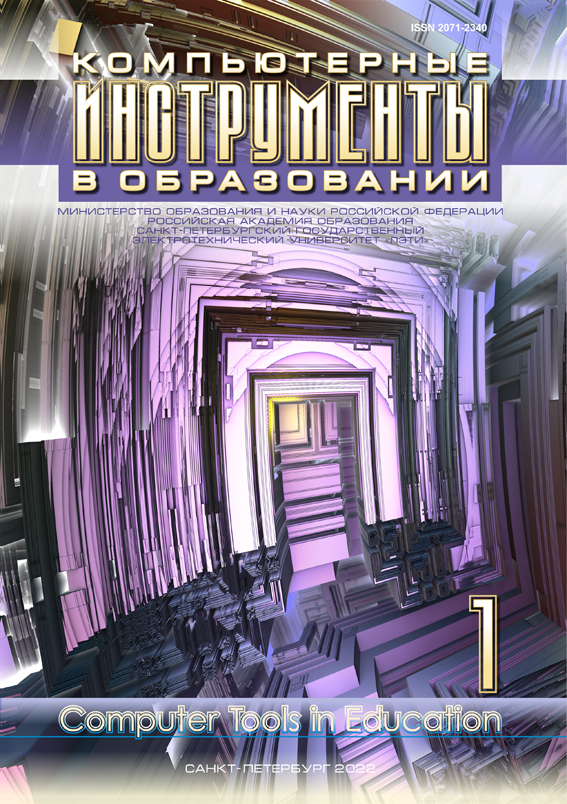Constructive Problems in Discrete Mathematics: a Comparative Analysis of the Exam with and without a Computer
Abstract
The paper analyzes an experiment on the use of manipulators for solving constructive tasks related to the different concepts in teaching discrete mathematics students of a technical university. These concepts include a logical circuit, a finite automaton, a regular expression, a Turing machine, etc. In these problems, it was required to build some construction with given properties. The constructed structures could be tested on the data entered by the user, that is, the possibilities of feedback could be used when searching for a solution. However, the computer tools used --- manipulators --- did not allow checking the correctness of the input solution. The data of the experiment, in which about 100 students participated, are presented. In the experiment, one part of the students was asked to take the exam on a computer with the possibility of using manipulators, while others solved the same tasks «on paper». About half of the tasks were not equipped with manipulators, that is, they were theoretical tasks typical of a written exam. In the proposed set, some constructive and theoretical tasks had a common object, so the study studied the possible impact of constructive activities on the subsequent solution of a theoretical task on the same topic. Also in this experiment, the same problem statement was used for different forms of representation of the mathematical essence, for example, in the terminology of constructing a finite automaton, regular expression, grammar, algorithm. On the basis of statistical processing of the results, conclusions were drawn about a significantly better solving of constructive problems with computer support and about the negative impact of a computer in solving problems that required mental operations that do not have an adequate representation in computer support, for example, on a computer with instrumental support, it is much more effective to solve problems by printed aids. Based on the analysis of the results, some other hypotheses were stated, which are not statistically confirmed, but can serve as a starting point for further research.
References
2. A. S. Chukhnov, “Constructive Problems in Competitions in Mathematics and Computer Science,” Computer tools in education, no. 6, pp. 56–62, 2018 (in Russian); doi: 10.32603/2071-2340-2018-6-56–62
3. S. G. Ivanov, S. N. Pozdnyakov, and A. S. Chukhnov, Zadachi Olimpiady po diskretnoi matematike i teoreticheskoi informatike. Textbook [Tasks of the Olympiad in Discrete Mathematics and Theoretical Computer Science. Textbook], St. Petersburg, Russia: ETU (LETI) Publ., 2021 (in Russian).
4. S. N. Pozdnyakov, A. S. Chukhnov, and N. N. Pangina, “Analysis of the Understanding of the Material of Theoretical Informatics in Competitions and Olympiads in Informatics,” Computer tools in education, no. 2, pp. 55–67, 2018; doi: 10.32603/2071-2340-2018-2-55-67
5. T. V. Kudryavtsev, Psychology of technical thinking: process and ways of solving technical problems, Moscow: Pedagogy, 1975 (in Russian).
6. J. Hadamard, Lessons in Geometry: Plane geometry, Moscow: OGIZ, 1948 (in Russian).
7. I. I. Aleksandrov, Collection of geometric construction problems, Moscow: Uchpedgiz, 1950 (in Russian).
8. D. Barker-Plummer, J. Barwise, and J. Etchemendy, Tarski’s World, Stanford, CA, USA: CSLI Publications, 2008.
9. U. Kelle and N. Buchholtz, “The Combination of Qualitative and Quantitative Research Methods in Mathematics Education: A “Mixed Methods” Study on the Development of the Professional Knowledge of Teachers,” in A. Bikner-Ahsbahs, C. Knipping, and N. Presmeg, eds., Approaches to Qualitative
Research in Mathematics Education. Advances in Mathematics Education, Dordrecht, Netherlands: Springer, 2015, ch. 12, pp. 321–363; doi: 10.1007/978-94-017-9181-6_12
10. A. I. Orlov, Econometric. Textbook, Moscow: Publishing house "Exam 2002 (in Russian).
11. E. V. Sidorenko, Methods of mathematical processing in psychology, St. Petersburg, Russia: Rech, 2000 (in Russian).
12. E. V. Gubler, Computational methods for the analysis and recognition of pathological processes, Leningrad, Russia: Medicine, 1978 (in Russian).
13. B. E. Starichenko, Processing and presentation of pedagogical research data using a computer, Yekaterinburg, Russia: Ural State Pedagogical University, 2004 (in Russian).
14. A. G. Trofimov, “Testing hypotheses about the probability of "success"in the Bernoulli scheme,” in Math statistics, Moscow: NRNU MEPHI, 2022. [Online lectures] (in Russian). Available: http://datalearning.ru/index.php/textbook?cid=1&mid=3&topic=3
15. StatSoft Russia, “Knowledge Portal. Global intellectual resource,” in Statistica.ru, 2022. [Online] (in Russian). Available: http://statistica.ru

This work is licensed under a Creative Commons Attribution 4.0 International License.







